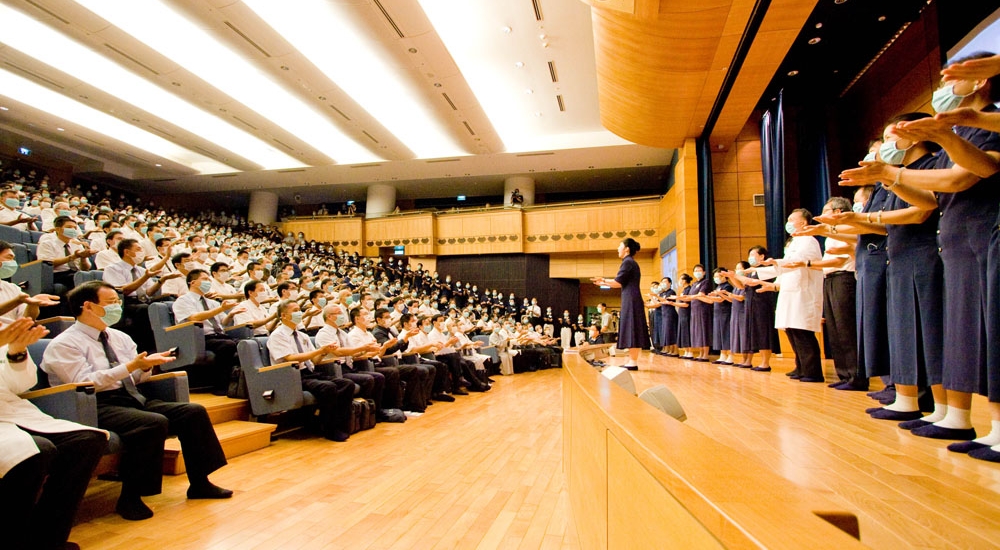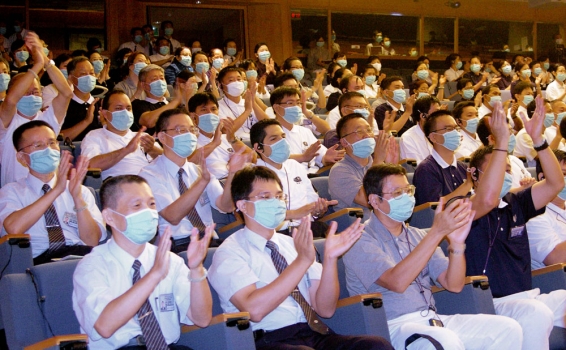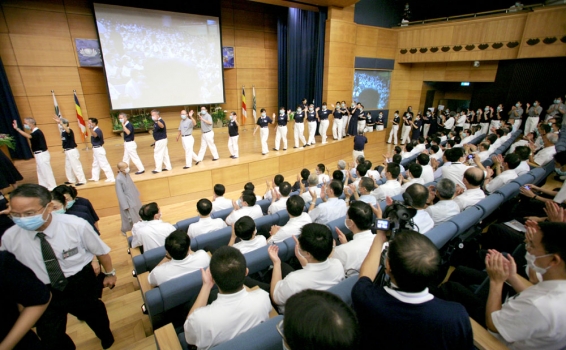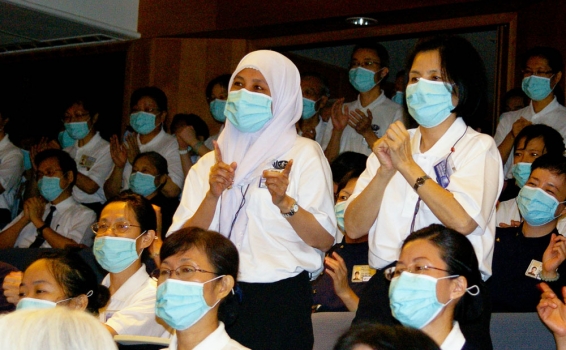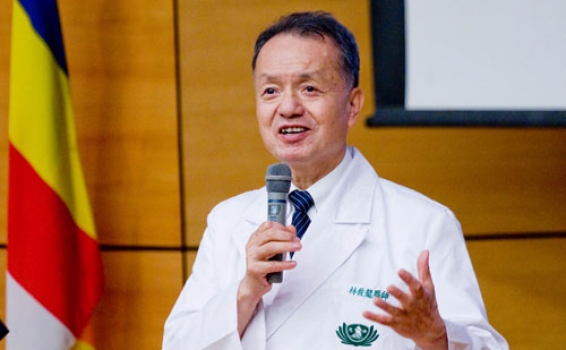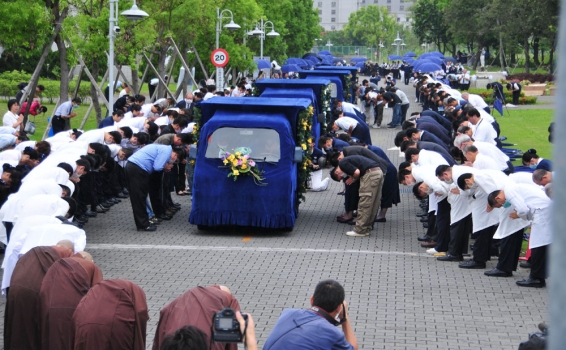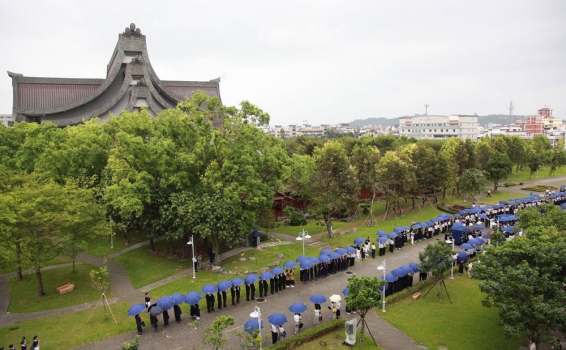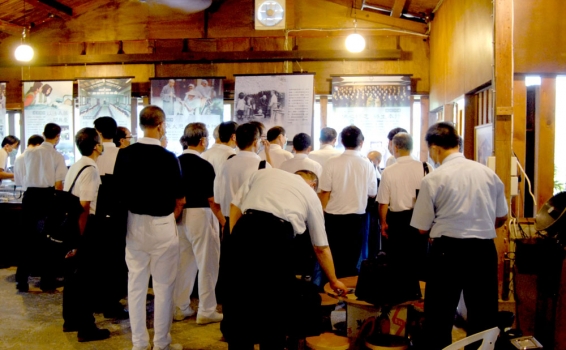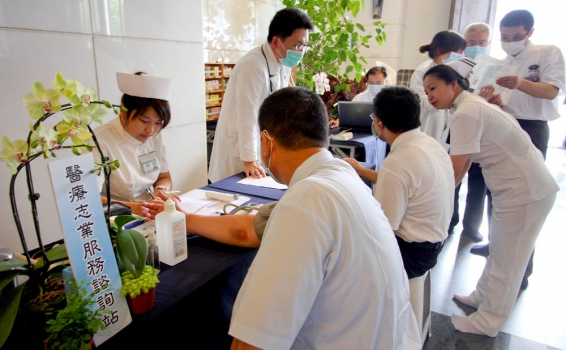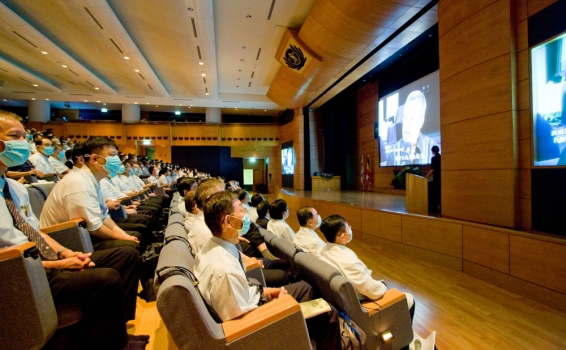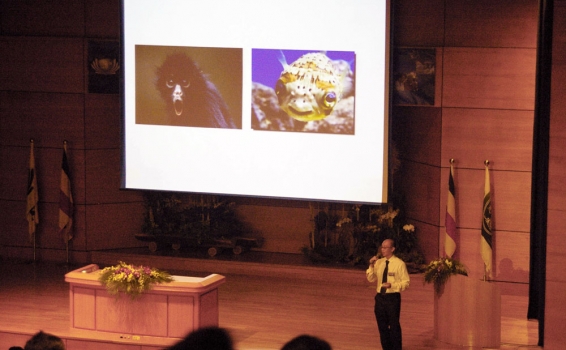The 11th Anniversary of TIMA
Saving lives is the natural responsibility of professional medical personnel, but being good-hearted is something everyone can and should do.
Throughout 20 countries and across five major continents, TIMA(the Tzu Chi International Medical Association) members gathered in Hualien (Taiwan) before the Mid-Autumn Festival to share their experiences and to advance medicine. TIMA champions a new approach to medicine – one that is centered towards patients with respect and love.
The 11th TIMA conference was designed to focus on protecting the lives of human beings and improving our environment - the mother Earth.
Members participated in simulation studies and learned first hand from their fellow Tzu Chi’ers to extend comfort and love to survivors of natural disasters. They also attended a concert in remembrance of the cadavers and the organ donors. It is a testament to the act of great love that life can be extended to others.
Written by Feng-Ying Peng, Shih-Tsai Chen & Chiu-Hui Huang
“When we are hand-in-hand, lives once again rise from ruins. Love is germinating in each of the seedlings and they grow slowly but steady with love from our hearts…”
That was the lyrics of the song by “New Sprout” played in the Jing Si Hall in memory of the victims that perished in the “921” Taiwan earthquake. At the same time, a documentary depicting Tzu Chi members consoling and assisting the survivors was played on the big screen. Ten years after the earthquake, ceremonies commemorating the victims were held in different locations across Taiwan. Today, October 1, 2009, the 11th anniversary of the Tzu Chi International Medical Association has officially begun.
Owing to the deadly H1N1 flu virus still widespread at the time, infrared devices to measure body temperatures were installed both in front of the dormitories and the Jing Si Hall. Hand sanitizers were also distributed and everyone wore a flu mask as a precaution. Participants were expected to pay extra attention to personal hygiene and general health condition so that the conference could go on without interruptions.
All of the Caring Hearts in the World Are United As One
At the opening, Tzu-Yueh Lu introduced the preparation and planning team to take center stage. The team was made up of 500 volunteers who participated in different stages behind the scene and to serve TIMA attendees from over 20 different countries including 347 doctors, nurses, pharmacists, and volunteers. The team sang a welcoming song to the audience in many different languages (Chinese, English, Japanese, Indonesian, Spanish, and Zulu) to ensure they felt at home and of one family.
Dr. Chin-Lon Lin, CEO of the Tzu Chi Medical Mission, commented on the extra effort spent on the conference. The planning began last year right after the previous one ended. He thanked all the volunteers for attending the conference, and expressed deepest gratitude to those who came to help the Marakot flooding last year by providing support and fund-raising. With their hard work and love, survivors of the disaster can resume their livelihoods.
Dr.Lin said a Tzu Chi’s comprehensive plan for the disaster victims includes immediate relief of the basic necessities such as food and shelter, continuous medical care for the sick and injured, loving care and support for their psychological wounds, education for the children and permanent housing for all. Hopefully, victims can set aside their pain and resume their normal living. The mountains with its wild life will have a chance to recover in the meantime.
Love Our Planet - Reduce Energy Consumption & Carbon Footprints
From the very beginning, TIMA encouraged people to use the staircases instead of the elevators, stick to a vegetarian diet, and reduce the use of air-conditioning to conserve energy. ChungHo Wang (PhD, Academia Sinica), was invited to speak on the subject of global warming.
Dr. Wang cited the recent Marakot as an example that such a calamity is a lesson to be learned. It is a reminder that mankind is responsible, and therefore we need to act responsibly to correct our own mistakes. For example, Wang uses public transportation rather than driving his own car. He carries reusable eating wares (chopsticks and bowls) with him. He carries extra sets just in case his friends forget theirs. His persistency has persuaded his family and acquaintances to follow his example. More and more people are gradually becoming environmentally conscious and are willing to join-in to this great cause.
Dr. Wang told every person not to underestimate his or her own power. “No one is insignificant,” he said. He also spoke of the correlation between TIMA and global warming, “the production and consumption of meat is detrimental to the green forests, therefore, TIMA members are all vegetarians.” He encouraged everyone to do likewise in order to be healthy and to reduce consumption of natural resources. The future of medicine is disease prevention and living responsibly and being green.
Making Good Use of Life
Similar to last year, attendees participated in “Simulation Surgery” organized by the Tzu Chi senior doctors and TIMA personnel. These simulation sureries were held in the Medical Simulation Center at the Tzu Chi University and were beamed to the lecture hall inside the Jing Si Hall. The program continued for a total of four days.
On the very last day, at 6:40 in the morning, students, medical staff, and family members attended a ceremony bidding farewell to the cadavers, or “Silent Mentors”. The procession was solemn and respectful. People witnessed the unselfish giving to medicine and to a common cause - “useless versus needed use.” The meaning of life is not just to help others during this lifetime, but to extend that life through the cadaver to advance science. Medical students benefit not only from the practice but they learn the humane spirit of great love.
Tzu Chi encourages everyone to fully utilize their lives. The donation of bone marrow stem cells and core blood cells, cadavers, and autopsies in a different country, are examples of how people can act selflessly in order to help others.
Yung-Hsiang Hsu, Director of the pathology department in the Tzu Chi Medical Center in Hualien, “We have performed 305 cases of volunteered autopsies,” and “the history of diseases encountered in these autopsies are similar to a Buddha script worthy of being read many times, and always providing something new to ponder.”
To honor the donors, Director Hsu led his students in a moment of silence before beginning the autopsies. Members of Tzu Chi venerate human life, but autopsies provide valuable experience for students in their training program and they help in the discovery of new approaches and treatments. Surgeons in pathological conferences may also come up with more varied methods of treatments.
Recounting the Stories of Tzu Chi’s Difficult Journey
In the afternoon of the first day of the convention, Master De-Tzu recounted the history of Tzu Chi difficult past. She spoke of Master Cheng Yen’s kindness and effort to relieve the suffering and the process in which the Tzu Chi world was created.
Master De-Tzu led the way with her vivid enunciation of the historical event. Many in the group had tearful eyes while visiting the Jing Si Abode. Among the group was a 70-year-old doctor from Australia who said in her second visit, “the pace of Tzu Chi is fast and if I don’t pay attention I won’t be able to keep up.”
At the exhibition center, they studied the posters describing the eight major missions where different instances of people participating in the world of Tzu Chi. In the medical section of the center, some were keen to find any reporting of their respective countries. In front of the world map showing a distribution of TIMA offices, people were eager to engage in conversation about their experiences.
Disaster Relief Means No Boundaries; Love Is What Drives the People Together
Many TIMA members joined Tzu Chi after experiencing firsthand some natural disasters. Many of their home countries such as Australia, Indonesia, and the Philippines are still ravaged by such disasters. The Kaisana hurricane landed the Philippines on September 26, causing severe flooding with heavy rains. Tzu Chi immediately dispatched volunteers to help people stranded by the rain water. Doctor Smason who is the Philippine TIMA founder, had to cut short his visit after making a 30 minutes presentation because of the condition in his home country. He was anxious to get back to Philippines to begin work on the disaster relief.
Tzu Chi volunteers are always there to help whenever there is a disaster anywhere in the world. At the convention, psychiatrist Peter Lin from New York gave a speech on how to offer mental support to survivors of a disaster. He shared his own experiences in America when he had participated in rescues. He stressed the fact that one had to be prepared, or else the survivors might drag the rescuer into their desolation.
Dr. Lin was present at the free clinic for the Sichuan earthquake relief last year and he worked with the American Red Cross in the United States. He began his speech with a fable.
“Once upon a time, there was a sudden flood in a forest, and the monkeys on the ground started climbing the trees for safety. They then saw many fishes swimming in the flood waters. They worried that the fishes with no arms or legs would be unable to climb the trees. So they worked together to scoop the fishes out of the water.” People laughed when they heard the monkeys trying to save the fishes in a flood. Dr. Lin used the story to remind everyone that, without experience and methodology and by being only good-hearted, one may actually cause more harm than good.
According to Lin’s analysis, most people have a strong will to survive, allowing them to pull themselves out of the wreckage after a disaster and gradually put it behind them. Two years after a disaster, only 20% of survivors need mental support. They include children, the elderly, the disabled, drug addicts, alcoholics, and the front-line rescue volunteers.
“At the beginning of a disaster volunteers are the ones that need special counseling the most. Victims and survivors usually need help after two months following the disaster,” said Lin. He suggested that Tzu Chi volunteers should also bring a booklet with them listing the symptoms to help diagnosis their own problem early on while doing the rescue work. Relief involving victims and survivors is demanding both physically and mentally. Bombarded constantly with the victims pain and suffering can build up pressure that can lead to depression.
Talking about the relief work in Taiwan, Yuen-Ching Wang from the religious department of the Tzu Chi Foundation thanked everyone for their presence. The video footage of typhoon Marakot reviewed damages to the landscape in the southern region. Tzu Chi volunteers quickly mobilized a rescue effort with help from 52 countries including South Africa and Dominica Republic. They prayed for the people in Taiwan and helped raise funds for the relief effort. Love is a cycle of kindness from people around the world.
Tzu Chi’s medical mission has been in existence for over 20 years. With the successful organ donations and cadavers program in place, TIMA members worldwide swear to dedicate their lives to continue their work to help the needy, the impoverished, and the victims of disasters.

